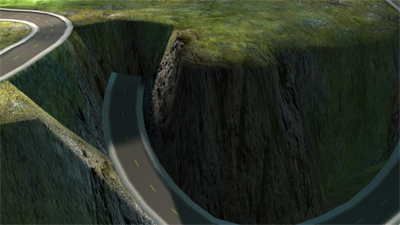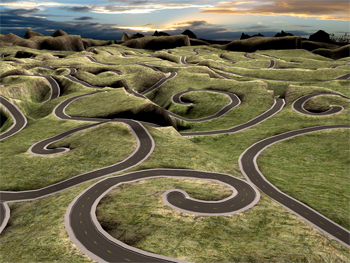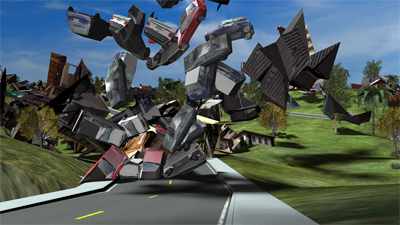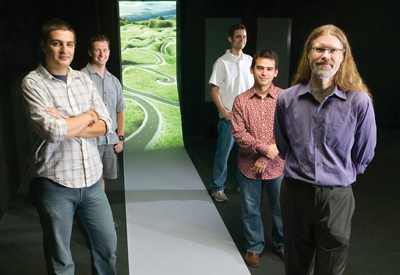UC San Diego Artist Uses Computer ?Game? to Explore Algorithmic Nature of Urban Development
Sheldon Brown’s ‘Scalable City ’ Installation Anchors Grand Opening of gallery@calit2 on Oct. 23
San Diego, Oct. 13, 2008 -- New-media artist Sheldon Brown has traveled as far as China and the Czech Republic to stage earlier versions of his work "Scalable City". However, he won't have to hop a plane this time, because the interactive art work will be on display at a new venue on the University of California, San Diego campus - barely 20 yards from Brown's office on the first floor of Atkinson Hall, the UCSD headquarters of the California Institute for Telecommunications and Information Technology (Calit2).
|
The Scalable City is a continually developing project which explores how our world is re-imagined and transformed by the ever-increasing use of computation. The work is displayed across media, including game installations, sculptures and digital prints.
The exhibition will open to the public on Oct. 23 in the gallery@calit2, part of the UC San Diego division of the California Institute for Telecommunications and Information Technology (Calit2). The launch coincides with the grand opening of the gallery at a reception scheduled for 6-8 p.m. the same day. Scalable City will run through December 15, 2008.
The central piece of the installation on display in the gallery@calit2 is an interactive computer game involving users, data and algorithms as applied to urban development. "My work creates an urbanenvironment via a data visualization pipeline," said Brown, who directs UC San Diego's Center for Research in Computing and the Arts (CRCA) and its Experimental Game Lab. "Each step in this pipeline builds upon the previous one, amplifying exaggerations, artifacts and the patterns of algorithmic process."
|
"Scalable City places responsibility for the new landscape on each user, whose activities are simultaneously constructive and destructive," said Brown. "By applying computational processes to design decisions, it becomes easy to see how development can produce unintended effects after much iteration. Even the smallest design decision today to build a road can lead, at the extreme, to drastic changes in the built environment that were probably neither intended nor wanted." "Sheldon Brown played a critical role in formulating how we integrated the arts into Calit2's multidisciplinary vision of our technological future," said Ramesh Rao, Director of the UC San Diego division of Calit2. "We are delighted that the official opening of the gallery@calit2 could be timed to coincide with the installation of an interactive work that has been evolving before our very eyes ever since CRCA and Calit2 moved into this building in late 2005."
|
Support for the development of Scalable City comes from IBM, Intel, Sun Microsystems, Vicon, High Moon Studios, the UC Discovery Grant program, CRCA, as well as the UCSD division of Calit2.
Students have played a critical role in the development of Scalable City. Graduate and undergraduate students - from both the Visual Arts and Computer Science and Engineering departments - assisted Sheldon Brown on various phases of the work. They have included: Erik Hill, Daniel Tracy, Kristen Kho, Robert Twomey, Christopher Head, Prakhar Jain, Alex Dragulescu, Carl Burton, Mike Caloud, and Joey Hammer.
Brown's Scalable City reflects the gallery@calit2's interest in the nexus of innovation implicit in Calit2's vision, and aims to advance our understanding and appreciation of the dynamic interplay among art, science and technology.
Calit2 is a partnership between UC San Diego and UC Irvine, and houses over 1,000 researchers organized around more than 50 projects on the future of telecommunications and information technology and how these technologies will transform a range of applications important to the economy and citizens' quality of life. The institute has integrated new-media arts into its cross-disciplinary agenda.
Artist Bio
Sheldon Brown is an artist who works in new forms of culture that arise out of the developments of computing technology. He is Director of the Center for Research in Computing and the Arts (CRCA) at the University of California, San Diego (UCSD), where he is a Professor of Visual Arts and Artist-in-Residence at Calit2.
|
In addition to Ars Electronica in Austria, Brown has shown various forms of Scalable City at such places as the Museum of Contemporary Art in Shanghai, The Exploratorium in San Francisco, FILE 2008 in Sao Paulo, Brazil, The Kitchen in New York City, Zacheta National Gallery in Warsaw, Poland, SIGGRAPH 2007 and Supercomputing 2007, and other venues. He has been commissioned for public artworks in Seattle, San Francisco, San Diego and Mexico City, and has received grants from AT&T New Experiments in Art and Technology, the NEA, the Rockefeller Foundation, IBM, Intel, Sun, Vicon and others.
Note to Editors: High-resolution still images from the installation "Scalable City" are available on request to Doug Ramsey at dramsey@ucsd.edu.
Hours and Location:
gallery@calit2
Gallery Hours: Mon-Fri 11am-5pm, Oct. 23 - Dec. 15, 2008
First Floor, Atkinson Hall
University of California, San Diego
9500 Gilman Drive
La Jolla, CA 92093
Map & Directions: http://atkinsonhall.calit2.net/directions/
http://gallery.calit2.net
http://www.calit2.net
Related Links
Artist Website
Scalable City
gallery@calit2
Experimental Game Lab
CRCA
Media Contacts
Doug Ramsey, 858-822-5825, dramsey@ucsd.edu




